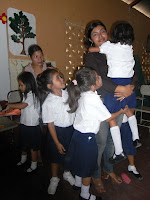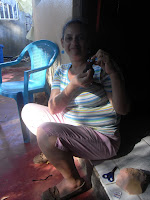

I´d given Alan the mosaic from my class in Granada to say thanks, and as I was packing up in the morning he gave me a beautiful dream catcher he´d made from twine, nuts and the feathers of the chocyero (parakeet)... so quick to make a bond when you travel in this way, also felt sad to be leaving. I was cheered by the ground on the way out seeming more solid (dew compacting the sand overnight?) so I had to push less, though there were still plenty of skiddy moments! Anyhow, I got back to Ticuantepe quicker than I´d excpected and was back on the carreterra (highway) heading into Managua by midmorning.
I´ve got to admit I was apprehensive about coming to Managua after reading the guidebook and other travellers tales, but contrary to all the warnings, having spent a week here I´ve had an amazing time. Admittedly I´ve had my own personal bodyguard, lookout and guide in the form of 15 year old Arlen, whose undertaken to not let me out of her sight, and to make sure that I have company whenever she goes to school! (slightly odd to be told by someone 11 years my junior to go back to the house while she goes to buy bread!)

Through one of those string of connections of friends of friends back home I was put in contact with the Nicaragua Solidarity Campaign (who I also had Spanish lessons with back in London), and given the enmails of their co-ordinator out here in Managua, Liz and Ernestina the head of a school they support here, los Pollitos. Arlen is Ernestina´s daughter. (And in one of those really odd conincidences, Angelica who I met at Liz´s house, had used to work for a woman called Veronica Campinelli, who comes from the same small village on the east coast of Scotland where I grew up, Gullane!) So a big thanks to Brian and www.imfa.org.uk for the link.

I spent the Monday I arrived with Liz, who was incredibly welcoming, and happy to let me rock up and start scrubbing my dirty laundry in her sink (laundry sink that is) straight after lunch! Liz originally came out to Nicaragua during the Revolution of the early 90´s and was telling me tales of her humanitarian work here over the years. After Hurricane Mitch Liz was translating for the British marines on the north eastern border with Honduras when she met the chief of the Miskito tribe. The Mosquito coast was incorporated into Nicaragua in 1894, and the land of the Miskito Indians is divided down the middle by the river which is used to mark the border with Honduras, so that the north of their land is in Honduras and the south in Nicaragua, meaning the Miskitoes need passports and visas to pass north to south. Their chief came with a letter for the Queen, hoping to present it to her in person, asking for her to review what he saw as a breach of the Miskito´s human rights. Both Liz and I hope he received an answer.
I spent a lot of Monday playing with Liz´s delightful 3 year old Ryan, who happens to be a meticulous colourer-in, and an incredibly lively bundle of energy... I think just watching him play on the climbing frame at Pizza Hut that evening wore me out more than any of the cycling! Or perhaps I slept so well that night at Liz´s because of the comfort of a real bed and an electric fan after four sweat soaked nights in my pod of a tent!
In a city which doesn´t use street names and where directions are given as routesd from landmarks, it was a relief to have Liz´s clear instructions of how to travel on to los Pollitos. With only a brief blip of lostness I arrived, met by a beaming Arlén and was immediately swept up into the daily life of the massively extended family of brothers, sisters, aunts, uncles, cousins, parents, grandparents and neighbours that makes up Barrio Edgar Mungia (barrio meaning neighborhood, refers to a small colection of houses in the few streets surrounding the central park, Managua being made up of many consecutive barrios).



Los Pollitos, where I´ve been spending my mornings joining in with the classes and playtime of the pre-school and 1st grade children, is a colourful building sitting behind the basket ball court at the top of the central Park. The fund raising eforts of Brian and the NSC back in the UK mean that Ernestina and the other teachers here receive a regular monthly wage, and has also improved the conditions of the site and the equiptment of the school, including adding a new block of two classrooms within the last year. It is a lively and vibrabnt environment, where the teachers are clearly loved, its genuinely heartwarming to see the affection between Patricia, Marsella, Soyla and their pupils. I feel incredibly lucky to have been so warmly welcomed to participate in the classes, where I´ve heard lots of singing, seen Spanish and maths classes, helped out with making paper windmills with the first grade, and even led a mini English session! I´ve given a couple of imporomptu demonstrations of paper folding for kids with a couple opf the teachers, and whiled away one afternoon showing Marsisella how to make little soft toys from scrap material. My camera´s been a big hit too, with the kids taking turn agçfter turn at photographing each other and their teachers. Wicked!








More than anything its been a delight to be so unquestioningly absorbed into the endless flow of games both in the playground and in the park late into the evenings. In what feel like a very safe and secure environment kids of all ages, from tiny little ones up to teenagers, play in big groups at chase and tag games, never ending variations of ball games (apart from basketball, despite the court, none of the balls bounce as they´re mostly semi flat) and acrobatic tumbling over the swings, monkey bars (paso mano) and seesaws. It´s a rough and tumble way opf life that includes everyone,where sharing is a natural given and the kids look after one another in a teasing bantering and competitive way, (its only on a couple of very rare occasions when playfighting has turned a bit nasty or tears have flown, these kids are really hardy and full of laughter.) I´ve only really experienced this kind of community based life before in Urubamba in Peru, and it reminds me of my parent´s generation´s stories of growing up.

As the new gringa in the barrio I´ve been a bit of a source of fascination for the kids, who are great in finding my lack of Spanish completely insignifigant! Peggy came in handy today when Arlén and I took ot in turns giving the littler kids lifts (vuelta´s) round and round the square. The most I managed at a time was three, two kids sitting on the pannier rack at the back, one in front on the crossbars...(good job I´ve built my legs up on the hills these last weeks) they were delighted!



The adults too have been hugely generous with their time and company, and are also totally unfazed by my pigeon Spanish. It´s been fascinating comparing the customs of the UK and Nicaragua. Isaac´s dad Jerry seemed amazing when I confirmed the pub culture stories he´d heard from another gringa, and finds it strange that so many people smoke pot regularluy, considering here being caught with a spliff can mean 2 years in prison. He was also impressed by jobseeker benifit and help finding work, and was telling me about the thousands of dollars Nicaraguans will pay to get ilegal access to the USA as it is so hard to obtain a visa legally.
Food is always a point of interest, I´ve adjusted to the Nicaraguan diet of callo pinto (rice and beans) at all three meals, served with eggs, bread and sweet black coffee for breakfast, and meat, salad, pasta and bread at lunch and dinner. After explaining how we often have sweet breakfasts, bread toasted in a toastie-maker appeared with butter and milky coffee this morning as a treat... so thoughtful!



I´m often asked my age, and if I have kids, and my answers (26, no) are always taken without surprise, even though this is such a family based community, a sign of how acceting everyone is. It seems girls here marry as young as 14, and will have children within the year, though any wait til they are older, 18, 19, or in their early 20´s. Many of the adults I have spoken to have older children at university, which the families pay for as is not subsidised by the government, law and medicine seem popular subjects. Religion also comes up often, and in a place I was expecting to be mainly Catholic, I think so far I have met more Mormons, interesting!


Anyway, my days as a Mannaguan are coming to an end, (until July that is, when I return here before my flight home) as I plan to cycle out on Monday after a weekend of exploring.



























